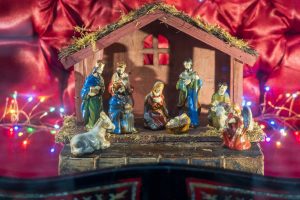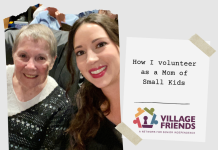When I told my husband what I was working on, his reaction was, “Really? First MLMs and now Santa? You just felt like not enough people hate you yet? We’re going to have to move.”
 Before you whip out your pitchforks in the comments, hear me out. Last year I wrote about our family’s indecision regarding Santa. I laid out what I felt were our three options: 1) The Full Santa Experience, 2) Mostly Ignore Santa, or 3) Santa Lite. After much reading and thought, we’re going with a cross between options two and three: Santa Very Lite. We will teach our kids about St. Nicolas, the real person, but we’re going to treat the modern version of Santa Claus like any other imaginary character — fun to watch movies and read stories about and play pretend if that’s what our kids want to do. My husband and I are not going to pretend that any gifts are from Santa. If there are fun local events that involve Santa, we’ll happily attend, but I’m skipping mall Santa photos (because crowds). My daughter and I will continue our tradition of baking lots of cookies for family, friends, teachers, and our postman and delivery drivers, but we won’t set any out “for Santa.” My children’s preschool usually does pictures with Santa and that’s totally fine with me, but if my kids don’t want to participate, I’m not forcing the issue. I plan to follow my kids’ lead as they get older. If they want to play pretend regarding Santa as they learn about him from their friends, I’m not going to crush their little spirits. But if they ask me questions, I will answer honestly.
Before you whip out your pitchforks in the comments, hear me out. Last year I wrote about our family’s indecision regarding Santa. I laid out what I felt were our three options: 1) The Full Santa Experience, 2) Mostly Ignore Santa, or 3) Santa Lite. After much reading and thought, we’re going with a cross between options two and three: Santa Very Lite. We will teach our kids about St. Nicolas, the real person, but we’re going to treat the modern version of Santa Claus like any other imaginary character — fun to watch movies and read stories about and play pretend if that’s what our kids want to do. My husband and I are not going to pretend that any gifts are from Santa. If there are fun local events that involve Santa, we’ll happily attend, but I’m skipping mall Santa photos (because crowds). My daughter and I will continue our tradition of baking lots of cookies for family, friends, teachers, and our postman and delivery drivers, but we won’t set any out “for Santa.” My children’s preschool usually does pictures with Santa and that’s totally fine with me, but if my kids don’t want to participate, I’m not forcing the issue. I plan to follow my kids’ lead as they get older. If they want to play pretend regarding Santa as they learn about him from their friends, I’m not going to crush their little spirits. But if they ask me questions, I will answer honestly.
Here’s why.
Trust. So much of what we teach our kids about life (and possible dangers) when they are little is not physically seen. We ask them to take our word for it A LOT.
“That’s hot, I won’t let you touch it.”
“If you don’t put on your jacket, you’ll be cold when you go outside.”
“I need you to wash your hands to get the germs off so you don’t get sick.”
“Let’s pray and ask God about it.”
“It’s kind to share toys with friends.”
“Eating cookies for every meal is not the healthiest choice for your body.”
“We can’t drive the car until you are safely buckled in your car seat.”
Kids are naturally little scientists and explorers. They want to test boundaries, ask why, and do some rebelling just to see what happens. We are their safe space, their protectors, their teachers, their comforters, and their guides. We ask them to trust us about things big and small every single day. My daughter asks a lot of questions, and I answer them as honestly as possible. I want her to trust me completely. If she can’t trust her daddy and I — the two people who love her more than anyone else on the planet — then who can she trust? Without getting too far into attachment theory, kids develop their ideas of themselves and the world based on their bond with their primary caregivers. Am I safe? Is the world around me safe? Are people trustworthy? I want my kids to know that no matter what craziness is going on around them, they can always come to us for love, support, and honesty. We may not know everything and they are going to have questions that we just don’t have the answers to, but we will never intentionally mislead or lie to them. We are teaching our children about God, Jesus, and the Holy Spirit. We teach them that although we don’t see the Trinity in physical human bodies, we know that they are real and active all around us all the time. If we also tell them that Santa Claus is real and active even though we don’t see him, how are they going to feel about God when they find out that we haven’t told the truth about Santa? I don’t want to find out how a breach of trust like that would affect my kids.
 Awareness. We know that we are privileged. My children, through no choice or merit of their own, were born to married, college educated parents living a white collar, middle class life. We live in a nice house. We drive safe, (mostly) reliable vehicles. We are able to provide clothes, food, toys and books, heat and cool our home to our comfort level, have warm water for baths and to clean our clothes, and have experiences like trips to the zoo and the beach. My husband has visited poorer countries. As we were discussing our Christmas budget the other day, he reminded me that we have chosen to spend on one holiday what families in other countries earn in an entire year. We don’t want to lose sight of this reality, and we want our children to grow up understanding that we are fortunate and should be grateful for everything that we have. It would be fairly easy for us to put lots of gifts under our Christmas tree and write “Santa” on the labels. But we know that kids will inevitably discuss what they received for Christmas. And we know that when our kids start public school it is very likely that they will have friends or classmates without the same means as our family. Kids whose families aren’t able to provide expensive gifts may be left wondering whether Santa is just a jerk or whether he doesn’t love them as much as other children. I am not going to be the reason that another child feels hurt or rejected because Santa did not bring them a motorized Hummer or Xbox. I also don’t want a struggling mom, dad, or grandparent feeling guilty or pressured to make unwise financial decisions to keep up with their children’s classmates. If our children get larger gifts, they will know that they come from their parents or grandparents, and hopefully they will not take them for granted.
Awareness. We know that we are privileged. My children, through no choice or merit of their own, were born to married, college educated parents living a white collar, middle class life. We live in a nice house. We drive safe, (mostly) reliable vehicles. We are able to provide clothes, food, toys and books, heat and cool our home to our comfort level, have warm water for baths and to clean our clothes, and have experiences like trips to the zoo and the beach. My husband has visited poorer countries. As we were discussing our Christmas budget the other day, he reminded me that we have chosen to spend on one holiday what families in other countries earn in an entire year. We don’t want to lose sight of this reality, and we want our children to grow up understanding that we are fortunate and should be grateful for everything that we have. It would be fairly easy for us to put lots of gifts under our Christmas tree and write “Santa” on the labels. But we know that kids will inevitably discuss what they received for Christmas. And we know that when our kids start public school it is very likely that they will have friends or classmates without the same means as our family. Kids whose families aren’t able to provide expensive gifts may be left wondering whether Santa is just a jerk or whether he doesn’t love them as much as other children. I am not going to be the reason that another child feels hurt or rejected because Santa did not bring them a motorized Hummer or Xbox. I also don’t want a struggling mom, dad, or grandparent feeling guilty or pressured to make unwise financial decisions to keep up with their children’s classmates. If our children get larger gifts, they will know that they come from their parents or grandparents, and hopefully they will not take them for granted.
 Distraction. Jesus’ birth as a human child to a virgin woman is the reason for Christmas. We give each other gifts as a celebration of God’s incredible gift of his Son to the world. It is a beautiful, joyous, wonderful holiday for that reason. Without Jesus, there would be no Christmas. That’s what we are teaching our children. I believe that focusing on the current cultural iteration of Santa Claus or making him the center of our Christmas celebrations and traditions is a distraction. I want to teach our children that Saint Nicholas was a real person who became well known because he gave to the poor out of his love for Christ. We can and should follow St. Nick’s example of giving generously to others. But Christmas is about celebrating Jesus, not Santa Claus or presents. The flying reindeer, elves, and toy shop in the North Pole are fun to think about and play pretend, but they aren’t real. I want to keep our family priorities in the right order, and giving Santa an outsized role in our Christmas traditions does not accomplish that goal.
Distraction. Jesus’ birth as a human child to a virgin woman is the reason for Christmas. We give each other gifts as a celebration of God’s incredible gift of his Son to the world. It is a beautiful, joyous, wonderful holiday for that reason. Without Jesus, there would be no Christmas. That’s what we are teaching our children. I believe that focusing on the current cultural iteration of Santa Claus or making him the center of our Christmas celebrations and traditions is a distraction. I want to teach our children that Saint Nicholas was a real person who became well known because he gave to the poor out of his love for Christ. We can and should follow St. Nick’s example of giving generously to others. But Christmas is about celebrating Jesus, not Santa Claus or presents. The flying reindeer, elves, and toy shop in the North Pole are fun to think about and play pretend, but they aren’t real. I want to keep our family priorities in the right order, and giving Santa an outsized role in our Christmas traditions does not accomplish that goal.
Please don’t egg my house.












We don’t “do Santa” for the same reasons, although I hadn’t put a lot of thought into the awareness piece and I appreciate your insight there. Even though my husband and I have explicitly told our kids Santa is not real, at least one of them remains adamant that he is. *Sigh* Kids have their own ideas!
Comments are closed.